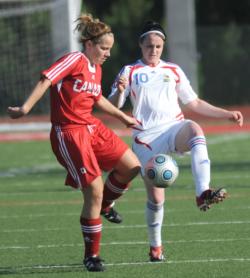
OUT ! Fighting homophobia and empowering LGBT+ in football
OUT ! Fighting homophobia and empowering LGBT+ in football
On 15 October, Sport and Citizenship took part in the third transnational network meeting “OUT- Fighting homophobia and empowering LGBT+ stakeholders in football” co-organised by Football Supporter Europe (FSE) and the Royal Belgian Football Association (RBFA). It was a unique occasion to discuss and speak up on a critical topic that has always been taboo for too long in both sport and society: LGBT+ and homophobia.
The conference was divided into two parts: the morning session was dedicated to a panel discussion where speakers debated on “Progresses and challenges in fighting homophobia in football.” In the afternoon, the audience was split into two workshop groups discussing the role of National Associations in involving supporter groups to create a more inclusive environment and, how can National Associations and Leagues become more inclusive for LGBT+ stakeholders.

Martin Endemann (FSE) moderated the morning discussions between Matthias De Roover (Amateur football player, mister Gay Belgium 2019), Di Cunningham (3 Lions Pride & Proud Canaries, UK), Sarah Gregorius (Former New Zealand National team player, Policy & Strategy Officer at FIFPro), and Claudia Krobitzsch (Diversity manager, German FA). Speakers sought to raise awareness on homophobia, and other sexual minorities in football, tackling the issue from different angles. From a player’s perspective, as De Roover outlined, it is indeed difficult to show your sexuality when, very often, clubs discourage players from showing their homosexuality. On the other hand, international institutions such as UEFA and FIFA are starting to make the first steps on the field by using international competitions as an important platform for their campaigns in support of the LGBT+ community. Finally, supporters also play a key role when it comes to promoting LGBT+ rights.
More and more clubs have, among their supporters, LGBT+ groups- as Di Cunningham pointed out, the latter are increasingly active at on the national and international stages, such as during European and World competitions.
The afternoon workshops provided an in-depth review of the topic putting forward some case studies and best practices already in place around Europe (namely in Norway and Germany), and they showcase a significant fact: the fight against homophobia is a universal issue, one that is unfortunately not just relegated to football.
However, football, considered as a social space where athletes, but also fans and other stakeholders gather, has the potential to directly contribute to the fight against this kind of discrimination. When we refer to football as a tool against homophobia, we include athletes and their responsibility as role-models for youngsters. We refer, moreover, to Football Associations and their power as decision-makers who are capable of strong actions to support the cause. And lastly, we refer to supporters who are the backbone of every sport, and they are working more and more towards a more inclusive space, not only on the pitch but also in the stands.
The conference was a stimulating occasion to tackle homophobia and discrimination in football from different angles: from the side of the federations to the supporters’ one. Sport and Citizenships is delighted to have participated in such an inspiring moment, and through its activities it is pleased to continue contributing to the fight against any sort of discrimination in sport.
